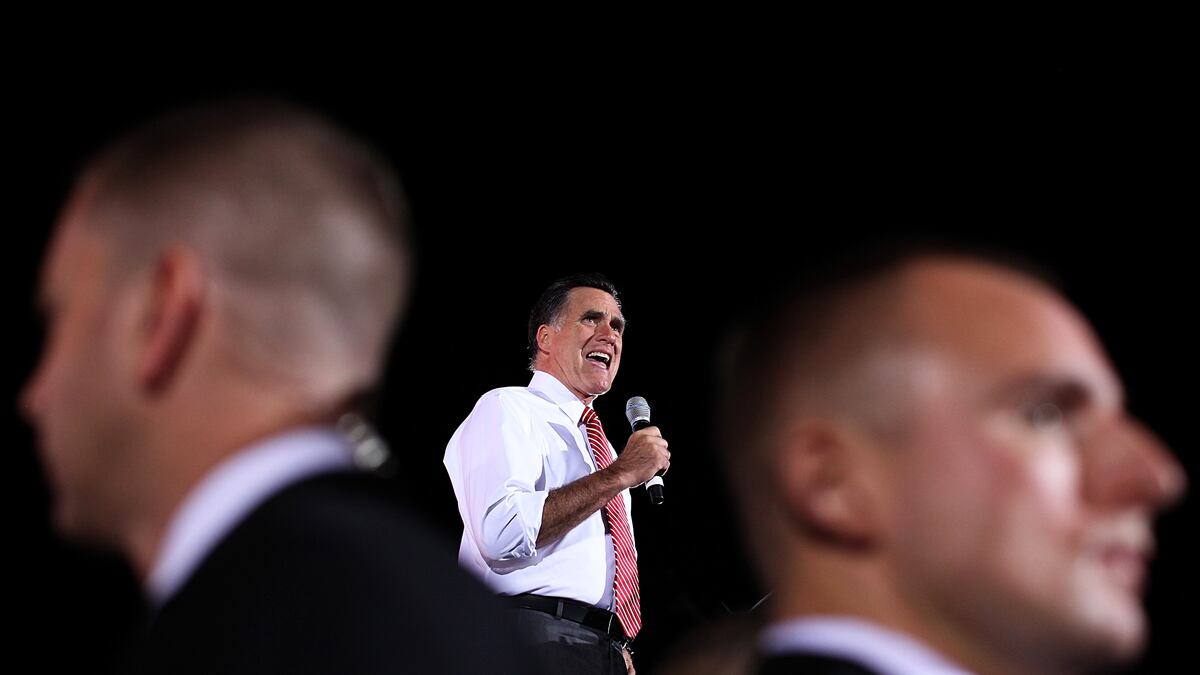The instant postdebate polls are showing a huge Romney victory. In CNN’s survey of people who watched the debate, 67 percent thought Romney did a better job, while just 25 percent thought Obama did. “No presidential candidate has topped 60 percent in that question since it was first asked in 1984,” observed CNN polling director Keating Holland. CBS’s poll of uncommitted voters showed a smaller but still enormous gap: 46 percent said Romney had won, while only 22 percent gave the victory to Obama.

But now the question is how dramatic a change this will mean in the polls for Romney over the next few days. Our best guess is that we’re looking at a swing of 3 to 4 points in Romney’s favor.
To understand why, let’s look at two other instances where incumbents who were leading in the polls were perceived to have lost the first debate of the campaign. In 1984, there was a clear consensus that Walter Mondale outperformed Ronald Reagan in their first debate. (Reagan, said George Will at the time, “gave the impression of a man who’d been stuffed full of numbers and statistics by his staff and went out trying to remember them and fit them in at the right point instead of being the natural, intuitive politician that he normally is.”) An instant Newsweek poll conducted by Gallup showed that, among registered voters watching the debate, 54 percent thought Mondale had prevailed, compared with only 35 percent for Reagan. Meanwhile, in a New York Times–CBS poll of undecided voters, Mondale was perceived to be the winner by 49 to 32.
A few days later, as polls began to assess the state of the race, they found that Mondale had gotten a bounce, but only a modest one. In an ABC poll, Reagan’s lead had gone from 18 points to 15 points. And CBS and The New York Times found that the gap had diminished from 26 to 20 points.
Next, consider 2004, when instant polls showed John Kerry beating George W. Bush in their first debate. CNN-Gallup found Kerry winning 53 to 37 among voters who viewed the debate. Among undecideds, an ABC poll found that Kerry had triumphed by 44 to 36.
As in 1984, there was subsequently a modest bounce for the challenger: Kerry went from trailing 44–52 to being tied, 49–49.
The first and most obvious lesson of this history is that it’s certainly possible to get a solid bounce from a debate—and this will almost certainly happen over the next few days for Romney.
But how sizable a bounce? Last night, Romney scored an even more dramatic victory than either Mondale or Kerry—which might suggest that he would receive a larger bounce than their postdebate increases of 3 to 6 points (Mondale) or 8 points (Kerry). We suspect, however, this will not be the case—that Romney’s bounce will actually be smaller than Kerry’s and probably at the lower end of Mondale’s.
One reason is that we simply live in more partisan times. It’s true that the number of voters identifying themselves as undecided with about a month to go before the election hasn’t changed much since 1984 or 2004. But in an age when many Republicans only watch Fox and many Democrats only watch MSNBC—and when Democrats tend to cluster in certain regions of the country and Republicans in others—it seems much less likely that large numbers of voters can be convinced to change their mind only a few weeks before going to the polls.
The other reason is, while Romney’s debate performance was impressive, his win required yet another ideological reinvention: a shift back to the center on taxes and economic policy. Coming from a candidate who was a moderate when he was governor of Massachusetts, then a conservative when he was seeking the GOP nomination, this latest move may further confuse the public. Voters generally felt certain about who Kerry and Mondale were as candidates and people; Romney, by contrast, is still very much a mystery both as a person and as a politician.
In the days to come, Romney will likely catch Obama in national polls or pull ahead. And he will probably do the same in swing states like Florida, Colorado, and Virginia, where Obama is currently holding a small lead of 1 to 3 points.
But while last night was an important win for Romney, no one should count Obama out. We have another presidential debate in 13 days, and history shows that a loss in the first debate does not spell disaster for future debates or the election. Mondale and Kerry certainly proved that point. The game has been changed, but maybe not for good.







